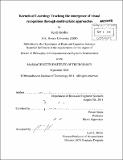Kernels of learning : tracking the emergence of visual recognition through multivariate approaches
Author(s)
Gorlin, Scott (Scott Merell)
DownloadFull printable version (12.73Mb)
Alternative title
Tracking the emergence of visual recognition through multivariate approaches
Other Contributors
Massachusetts Institute of Technology. Dept. of Brain and Cognitive Sciences.
Advisor
Pawan Sinha.
Terms of use
Metadata
Show full item recordAbstract
The visual system is a dynamic entity whose response properties depend on context and experience. In this thesis, I examine how the brain changes as we learn to see - what changes occur during the onset of recognition, in the mature visual system on the one hand, and in a developmentally nascent one, on the other? Working with normal adults, I focus on the processes that underlie the interpretation of images as meaningful entities. This interpretation is greatly facilitated by prior information about a stimulus. What are the neural sites that exhibit experience dependent changes? Using multivariate decoding techniques, I find pervasive evidence of such changes throughout the visual system. Critically, cortical regions previously implicated in such learning are not the same loci as sites of increased information. Examining the temporal mechanisms of recognition, I identify the perceptual state transitions corresponding to the onset of meaning in an observed image. Furthermore, decoding techniques reveal the flow of information during this 'eureka moment.' I find feedback processing when a degraded image is first meaningfully interpreted, and then a rapid transition into feed-forward processing for more coherent images. Complementing the studies with mature subjects, my work with developmentally nascent observers explores the genesis of visual interpretation. What neural changes accompany the earliest stages of visual learning? I show that children treated for congenital blindness exhibit significant cortical re-organization after sight onset, in contrast to the classical notion of a critical period for visual plasticity. The specific kind of reorganization suggests that visual experience enhances information coding efficiency in visual cortex. Additionally, I present evidence of rapid development of functionally specialized cortical regions. Overall, the thesis presents two complementary perspectives on the genesis of visual meaning. The results help advance our understanding of how short-term experience, as well as developmental history, shapes our interpretation of the complex visual world.
Description
Thesis (Ph. D.)--Massachusetts Institute of Technology, Dept. of Brain and Cognitive Sciences, 2011. Cataloged from PDF version of thesis. Includes bibliographical references (p. 121-130).
Date issued
2011Department
Massachusetts Institute of Technology. Department of Brain and Cognitive SciencesPublisher
Massachusetts Institute of Technology
Keywords
Brain and Cognitive Sciences.